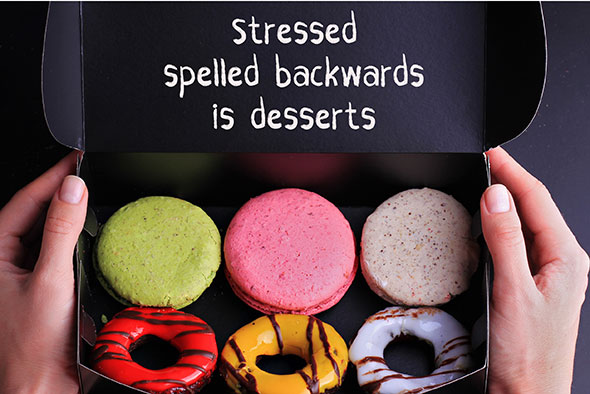
Stress Awareness & Your Diet

You are not alone if you reach for comfort foods when you are stressed out, often referred to as stress eating. There are hormonal responses in the body caused by stress that can lead a person to turn to food to temporarily feel better. It is helpful to recognize your body’s response to understand why you may want to reach for food or sometimes not want to eat and what you can do to maintain normal eating behavior when stressed. Knowing your body’s response helps you understand why you may want to reach for food or conversely, you may not want to eat and what you can do to maintain normal eating behavior when stressed.
Stress and Your Hormones
For some people when they are stressed out they may initially lose their appetite. This can be caused by the release of a couple different hormones, corticotrophin and epinephrine, that tend to trigger responses within the body to put eating on hold. Not eating can cause unintended weight loss which can be harmful to your health if you lose too much weight too quickly. When the body feels the effects of stress for a longer period of time it will begin to release a different hormone called cortisol. Cortisol generally will trigger an increase in appetite which can lead to over eating. This should drop when your stress levels drop but that doesn’t always happen.

Why do I crave comfort foods?
When individuals are stressed they aren’t necessarily reaching for more fruits and vegetables. Studies have shown that stress increases the intake of alcohol and foods higher in fat and sugar. When fat and sugar is eaten it has been shown to provide feedback to the brain to reduce stress. Even though it may temporarily make you feel less stressed these food items tend to be higher in calories and when eaten too frequently in excess can lead to obesity and heart problems.
Probiotics May Help
Newer studies are looking at the link to gut health and the brain. Probiotics provide a way to help keep your gut bacteria healthy and have been found to have a positive effect on stress disorders such as anxiety and depression. Studies provided a specific combination of mood probiotics, Lactobacillus helveticus R0052 and Bifidobacterium longum R0175, for 30 days and measured the change in stress and mood of the study participants. The results showed that the baseline mood and stress related test scores showed improved mood and decreased stress. The study also showed the cortisol levels dropped which is the hormone that can lead to overeating. This is a newer area of research so probiotics should not be used to replace any medications used to manage stress but could be beneficial in helping control some of the stress triggering hormones and helping you to reduce stress eating.

What you can do
- Be mindful about eating during stressful periods
- Think about what you can do to maintain a normal eating pattern when stress occurs
- Seek resources to help with simple relaxation and stress reduction techniques
- Talk to your physician about probiotic mood supplements that may be helpful
Download the PDF version of this article.
Learn More
Balance, HCR ManorCare’s comprehensive health and wellness blog, supplies readers with healthy ideas throughout the year. The blog is designed to serve as a resource, not only for patients, residents and families, but for anyone who strives to live a healthy, “balanced” life. For more information and help in making healthy choices, go to balance.hcr-manorcare.com and sign up to receive our newsletters. If you need help making a health care decision, visit our CareFinder and live chat.


